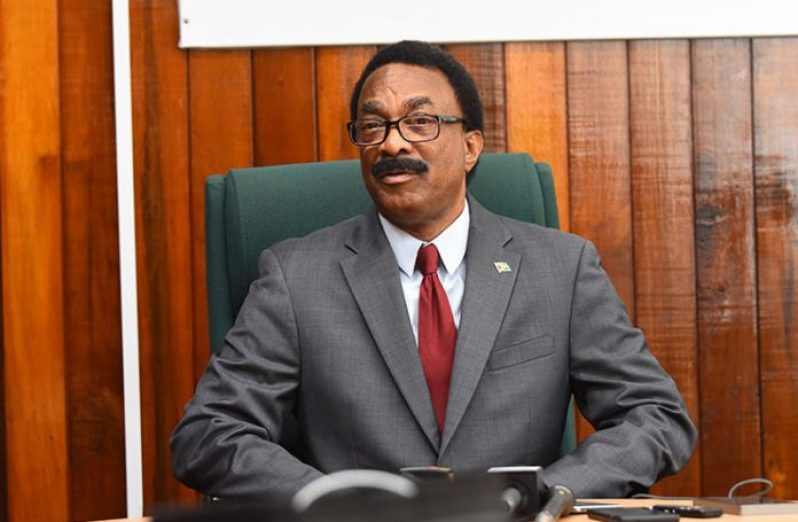…as GECOM revokes requirement for voters to verify registration
ATTORNEY-General Basil Williams has said that now that the Guyana Elections Commission has rescinded its order for persons to visit their offices to verify their identity before being placed on the voters’ list, it is incumbent upon the Court of Appeal to expeditiously hear the Administration’s challenge to the Chief Justice’s ruling that the removal of persons from the voters’ list is unconstitutional, and that residency was not a requirement to be on the voters list.
Attorney-General Williams has said that by virtue of Election Laws (Amendment) Act, 1991 Act No. 3 of 1991, the Legislature removed non-resident voting in Guyana, and that the Preliminary List of Electors should only include an Ambassador or High Commissioner; the wives and children of the Ambassador or High Commissioner; a member of staff of an embassy and their family in order to be registered as an elector.
On Monday, GECOM removed the necessity for every person whose name appears on the Preliminary List of Electors (PLE) to visit the registration office with their National Identification Card to verify their registration record. The move was intended to ensure that all eligible persons are included on the Official List of Electors (OLE). An Order Document on Monday stated that the previous National Registration (Residents) Order No. 70 of 2019, dated September 26, 2019 had been revoked. The new Order now only applies to all Guyanese citizens by birth, descent, naturalisation or registration, 18 years or older, or will attain the age of 18 by 31st December, 2019, and persons whose name appears on the Central Register in coming into operation of the Order.
NO OTHER CHANGE
No other details have been changed in comparison to the first Order issued by the Commission.
It remains that the period of Claims and Objections (C&O) for the upcoming elections will commence on October 1, 2019 and end on November 18, 2019.
The exercise provides eligible electors the opportunity to gain entry to the List of Electors, or make transfers, changes or objections to particulars in the Preliminary List of Electors (PLE). It is to be conducted following publication of the PLE at the registration offices/sub-office.
“Over the next few days, the Commission will set up temporary offices and mobiles countrywide to aid the efficient conduct of the exercise, and will publish the full list of those offices to ensure applicants or registrants can access the office within close proximity to them to have their transaction done,” the Commission had informed the public in a previous release.
The attorney-general, in appealing, in part, the decision of Chief Justice Roxane George-Wiltshire, had asked for an interim stay of execution of part of the judgment handed down by Justice George-Wiltshire on August 14, 2019 until the Fixed Date Application (FDA) is completely heard and a determination made.
He is maintaining that the Chief Justice erred when she ruled that it would be unconstitutional to remove persons from the National Register of Registrants, unless deceased or disqualified, pursuant to Article 159 (3) and (4).
OF NATIONAL IMPORTANCE
The AG noted that the issues in the matter touch and concern matters of national importance pertaining to general elections in Guyana, and the composition of the National Register of Registrants from which the Preliminary List of Electors is extracted.
He said that the only non-resident Guyanese that could be on the Register of Registrants are Ambassadors or High Commissioners, their wives and children and staff and their wives and children. All other non-resident Guyanese are excluded from the list. Williams said this underscores the requirement for residency during the qualifying period as contemplated by Article 159 of the Constitution.
He said, too, that under the principles of International Law, embassies, high commissions or consulate offices would be deemed to be the sovereign territory of Guyana and it would be as if the high commissioner or ambassador, family and staff would be voting in Guyana.
Additionally, he said that with the introduction of overseas voting in 1968, a reasonable inference is that residency in Guyana could not have been part of the 1980 Constitution as opposed to the 1966. The inclusion of residency in the 1970 Constitution was a clear oversight on the part of members of the Legislature, Williams has contended.
He said, too, that by virtue of Constitution (Amendment) No. 4 of 1991, the residency requirement for voting in Guyana was reinstituted, and became a necessary requirement. According to the Explanatory Memorandum for Constitutional (Amendment) Bill No. 36 of 1991 which was the Bill pertaining to Constitution (Amendment) No. 4 of 1991 prescribes: “The amendment to article 159 provides that from the 26th March, 1991, (the date when the Electoral Laws (Amendment) Act 1991, Act No. 3 of 1991, came into operation), a citizen of Guyana, who is not a diplomatic agent or member of staff of a diplomatic mission or the wife or child of such person, must be resident in Guyana in order to be qualified to be registered as an elector for elections.”



.jpg)








